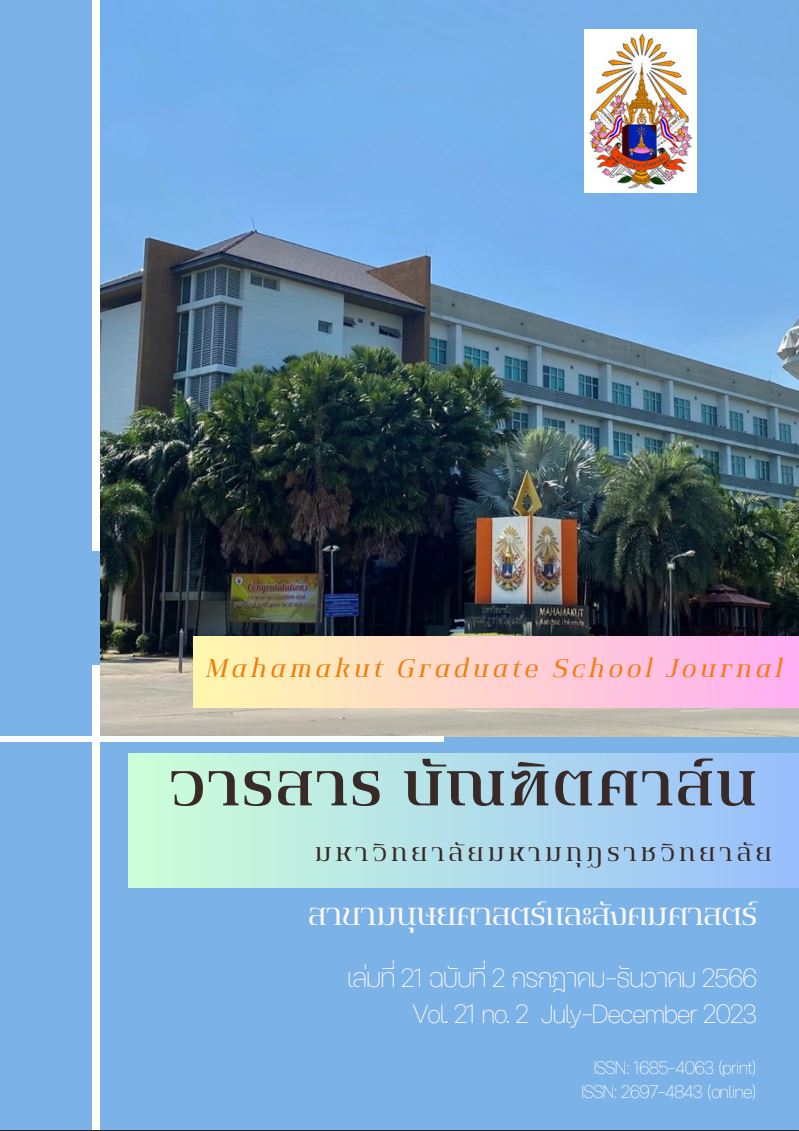อนาคตภาพการบริหารงานวิชาการของมหาวิทยาลัยสงฆ์ในทศวรรษหน้า
คำสำคัญ:
อนาคตภาพ, การบริหารวิชาการ, มหาวิทยาลัยสงฆ์บทคัดย่อ
การศึกษาครั้งนี้ มีวัตถุประสงค์เพื่อศึกษาอนาคตภาพการบริหารงานวิชาการของมหาวิทยาลัยสงฆ์ในทศวรรษหน้า ใช้เทคนิคการวิจัยเชิงอนาคต (Ethnographic Delphi Futures Research) เครื่องมือที่ใช้เป็นแบบสอบถามและแบบสัมภาษณ์เชิงลึก วิเคราะห์ข้อมูลโดยใช้ ค่ามัธยฐาน ค่าฐานนิยม ค่าพิสัยระหว่างควอไทล์ โดยใช้โปรแกรมสำเร็จรูปและการวิเคราะห์เนื้อหา
ผลการวิจัยพบว่า
อนาคตภาพการบริหารงานวิชาการของมหาวิทยาลัยสงฆ์ในทศวรรษหน้ามี 6 ด้าน มี 64 ตัวแปร มีแนวการบริหารงานวิชาการของมหาวิทยาลัยสงฆ์ในทศวรรษหน้าคือ 1) ด้านการวางแผนรับนักศึกษาและการผลิตบัณฑิต เป้าหมายจำนวนรับนักศึกษาการวางแผนรับนักศึกษาใหม่ต้องมีกลุ่มเป้าหมายหลากหลาย เช่น กลุ่มผู้สูงอายุ กลุ่มผู้สนใจปฏิบัติธรรม โดยการจัดทำหลักสูตรระยะสั้น 2) ด้านการจัดกิจกรรมการเรียนการสอน ในระบบการศึกษานอกระบบ การศึกษาตามอัธยาศัย การปฏิบัติการจะคำนึงถึงกลุ่มเป้าหมายเป็นหลัก ปรับรูปแบบกิจกรรมมุ่งสู่วิถีชีวิตแนวใหม่ 3) ด้านการประเมินผล ประเมิน ต้องมีหลักเกณฑ์และวิธีการที่ชัดเจน สมเหตุสมผล เชื่อถือได้ มีความโปร่งใส และมีมาตรฐานเดียวกัน 4) ด้านการเรียนรู้ที่เน้นการบูรณาการหลายศาสตร์ และประยุกต์พุทธธรรมกับศาสตร์สมัยใหม่ เน้นสาระเนื้อหาพระพุทธศาสนาที่สนองตอบและสามารถนำไปประยุกต์รับใช้สังคมมากขึ้น 5) ด้านการประกันคุณภาพการเรียนการสอน ส่งเสริม พัฒนาและประเมินประสิทธิภาพการดำเนินงานของระบบประกันคุณภาพ เน้นการปฏิบัติงานวิจัย การให้บริการวิชาการ การจัดการเรียนการสอน ที่เป็นระบบผสมผสาน และ6) ด้านการพัฒนาปรับปรุงการบริหารวิชาการ การบริหารวิชาการมหาวิทยาลัยสงฆ์ต้องมีความยืดหยุ่นทางเศรษฐกิจและสังคม
เอกสารอ้างอิง
กระทรวงศึกษาธิการ. (2552). ทศวรรษที่สองของการปฏิรูปการศึกษา. กรุงเทพมหานคร : โรงพิมพ์ชุมนุมสหกรณ์การเกษตรแห่งประเทศไทย.
ภาวิช ทองโรจน์. “ สภาสถาบันอุดมศึกษากับการพัฒนาอุดมศึกษา” เอกสารทางวิชาการ 4 กรกฎาคม 2561, เข้าถึงได้จากhttp://www.mua.go.th/users/bhes/catalog_h/ StdEdu/FormCurr/PavitSpeak.pdf
รายงานการวิจัยประสิทธิภาพและการบริหารจัดการของ มหาวิทยาลัยในกำกับของรัฐ.(2560.) (กรุงเทพฯ:พริกหวานกราฟฟิค,
พระศรีวชิราภรณ์ (2552). อนาคตศึกษามหาวิทยาลัยสงฆ์ในประเทศไทย : กรณีศึกษามหาจุฬาลงกรณ์ราชวิทยาลัย. วิทยานิพนธ์ปริญญามหาบัณฑิต บัณฑิตวิทยาลัย มหาวิทยาลัยนเรศวร.
รุ่ง แก้วแดง. (2544). ประกันคุณภาพการศึกษาทุกคนทำได้ไม่ยาก. กรุงเทพมหานคร : วัฒนาพาณิช.
พระสมนึก อนันตวรวงศ์. (2540). สถาบันสงฆ์กับการพัฒนาสังคมไทยในอนาคต ตามทรรศนะของพระผู้นำทางด้านวิชาการ. มหาวิทยาลัยธรรมศาสตร์ : กรุงเทพมหานคร
นาตยา ปิลันธนานนท์. (2526). อนาคตศาสตร์. กรุงเทพมหานคร : พีระพัฒนา.
ปราวีณยา สุวรรณณัฐโชติ. (2547). มาตรฐานและแนวปฏิบัติการเรียนการสอน MOOC ที่ได้รับการยอมรับในระดับนานาชาติ. กรุงเทพ : โครงการมหาวิทยาลัยไซเบอร์ไทย สำนักงานคณะกรรมการการอุดมศึกษา.
ดาวน์โหลด
เผยแพร่แล้ว
รูปแบบการอ้างอิง
ฉบับ
ประเภทบทความ
สัญญาอนุญาต
ลิขสิทธิ์ (c) 2023 มหาวิทยาลัยมหามกุฏราชวิทยาลัย

อนุญาตภายใต้เงื่อนไข Creative Commons Attribution-NonCommercial-NoDerivatives 4.0 International License.
บทความวิชาการและบทความวิจัยในวารสารฉบับนี้ถือเป็นความรับผิดชอบของผู้เขียนเท่านั้น บทความที่ได้รับการตีพิมพ์ในวารสารบัณฑิตศาส์น ถือเป็นลิขสิทธิ์ของมหาวิทยาลัยมหามกุฏราชวิทยาลัย ตามพระราชบัญญัติลิขสิทธิ์



